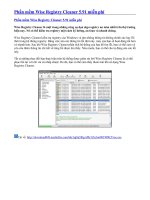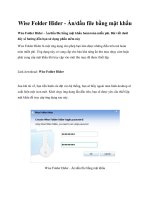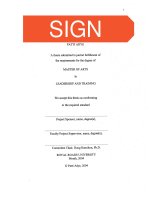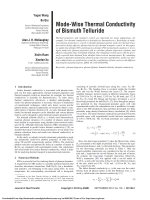Wordly wise 5
Bạn đang xem bản rút gọn của tài liệu. Xem và tải ngay bản đầy đủ của tài liệu tại đây (35.85 MB, 264 trang )
Direct Academic Vocabulary Instruction
Fourth Edition
Kenneth Hodkinson + Sandra Adams + Erika Hodkinson
EDUCATORS PUBLISHING SERVICE
Cambridge and Toronto
Editorial team: Carolyn Daniels, Marie Sweetman, Erika Wentworth
Cover Design: Deborah Rodman, Karen Swyers
Interior Design: Deborah Rodman
Vocabulary Extension Illustrations: Chris Murphy
Passage Illustrations for Lessons 3, 8, 16, 18: Q2AMedia
Passage Photograph Credits: Lesson 1: Boris Djuranovie/Fotolia; Lesson 2: Howard Sandler/Fotolia; Les-
son 4: Jim Curran/Fotolia; Lesson 5: Masterfile; Lesson 6: Library of Congress Prints and Photographs
Division Washington, D.C. 20540 USA; Lesson 7: Thomas Kokta/Masterfile; Lesson 9: John Foxx; Les-
son 10: Library of Congress Prints and Photographs Division Washington, D.C. 20540 USA; Lesson 11:
Dwight Smith/Fotolia; Lesson 12: Nathalie Speliers Ufermann/Dreamstime; Lesson 13: Unclesamy/ Fotolia;
Lesson 14: Library of Congress Prints and Photographs Division Washington, D.C. 20540 USA; Lesson
15: Masterfile; Lesson 17: iStockphoto/Thinkstock; Lesson 19: Hemera/Thinkstock; Lesson 20: Martina
Berg/Fotolia
©2018 by School Specialty, Inc. All rights reserved. No part of this book may be reproduced or
utilized in any form or by any electronic or mechanical means, including photocopying, without
permission in writing from the publisher.
Printed in Benton Harbor, MI, in May 2018
ISBN 978-0-8388-7703-6
345 PPG 21 201918
Contents
Lesson 1 Lesson 12
Friends for Life A Child of the Revolution
Lesson 2 Lessons 9-12 Review
When Money Grows on Trees
Lesson 3 26 Lesson 13
The Last Dinosaurs
33 Beware the Silent Crocodile
Lesson 4 38 Lesson 14
A Difficult Journey 165
45 The Wizard of Menlo Park
173
Lessons 1-4 Review 50 Lesson 15 178
When the Earth Quakes 185
Lesson Š 3 Lesson 16
On Top of the World
The Last Queen of the Islands 198
Lesson 6 65 Lessons 13-16 Review 203
The Pen Is Mightier Than
the Sword 72
Lesson 17
Lesson 7 204
Birds in Tuxedos 8 A Harvest of Sand 21
Lesson 8 Lesson 18 216
A Mouse Is Born
The First Thanksgiving 224
Lessons 5-8 Review 103 Lesson 19 229
The Lost City 235
Lesson 9 Lesson 20 240
104 ATale of Two Donkeys
The Sky's the Limit 248
m1
Lesson 10 116 Lessons 17-20 Review 253
With Moses to the
Promised Land 124 Pronunciation Key
256
Lesson 11 129
Off You Go into the Wild
Blue Yonder 136
Welcome to Wordly Wise 3000°
You've been learning words since you were a tiny baby. At first, you
learned them only by hearing other people talk. Now that you are a
reader, you have another way to learn words.
Obviously, it’s important to know what words mean, but lots of times,
we think we can get away without knowing some of them as we read.
This could cause a problem. Say you are reading the directions for a new
game. You know most of the words in the sentence you're reading. Then
you stop for a word you don't recognize:
Please do not touch the blegmy or your score will be lost.
You ask yourself, “What is a blegmy?” At first you think, “Well, it’s only one
word.’ But then you think, “What is it that I'm not supposed to touch?”
All ofa sudden, knowing what that one word means is important!
Clearly, the more words you know, the better your understanding of
everything you read. Wordly Wise 3000 will help you learn a lot of words,
but it can’t teach you all the words you'll ever need. It can, however, help
guide your learning of new words on your own.
How Do You Learn What Words Mean?
There are two main ways you learn what words mean: directly and
indirectly.
You have to learn some words directly. You may study them for a class,
look them up in a dictionary or glossary, or ask someone what they
mean. You also learn word meanings indirectly by hearing and reading
the words. In fact, the more you listen and read, the more words you'll
learn. Reading books, magazines, and online can help build your
vocabulary.
At school, you learn a lot of words directly. If you're using this book, you
are learning words directly. You are reading the words, learning what
they mean, and studying them. Then you are practicing them as you do
the activities. Finally, you might even use them in your own writing or
conversations. There is an old saying: “Use a word three times and it’s
yours.” Three times might not be enough, of course, but the idea is right.
The more you practice using a word, the better you understand it.
What Is “School Language”?
School language—or school words—are the words you find in the
books you read, from novels to textbooks, and on tests. You read them
online as you look up information. Your teacher uses these words to
explain an important concept about math or reading. Some have to
do with a particular topic, such as the building of the Great Pyramid
in Egypt. Others are words for tasks you are being asked to do, such as
summarize. These words are different from the kinds of words you use
when you're hanging out with your friends or talking casually with your
family. That's why you often need to study such words directly. In this
book, these important words are underlined to help you focus on them.
Wordly Wise 3000 is designed to teach you some of the words you need
to do well in school and on tests—and later on in your jobs. It will also
help you learn how to learn more words. Remember, there is no single
thing that will help you understand what you read as much as knowing
word meanings will.
How Do You Figure Out Word Meanings?
What should you do when you come to a word and you think you don’t
know what it means?
Say It
First, say it to yourself. Maybe once you do this, it will sound like a
word you do know. Sometimes you know a word in your head without
knowing what it looks like in print. So if you match up what you know
and what you read—you have the word!
Use Context
If this doesn’t work, take the next step: look at the context of the word—
the other words and sentences around it. Sometimes these can give you
a clue to the word's meaning. Here's an example:
Mr. Huerta had great respect for his opponent.
Wordly Wise 3000 + Book 5 v
Say that you don’t know what opponent means. Does Mr. Huerta have
respect for his teacher? His mother? Then you read on:
The two players sat across from each other in the warm room.
The chessboard was between them. Both looked as if they were
concentrating very hard.
Now you see that Mr. Huerta is taking part in a chess game. You know
that in a chess game, one person plays another. So his opponent must
be the person he is playing against. You reread the sentence using that
meaning. Yes, that works. In this sentence, opponent means “someone
you play against, or compete with.”
Use Word Parts
If the context doesn't help, look at the parts of the word. Does it have
any prefixes you know? How about suffixes? Or roots? These can help
you figure out what it means. Look at this sentence:
Shania had the misfortune to hurt her arm right before the
swim meet.
If you don’t know the meaning of misfortune, try looking at parts of
the word. You might know that fortune means “luck.” Maybe mis- is a
prefix. You could look it up, or maybe you remember its meaning from
studying prefixes in school. The prefix mis- means a few different things,
but one of them is “bad.” You try it out and reread the sentence using
that meaning. It would certainly be bad luck, or a misfortune, to hurt
your arm before a swim meet.
Look It Up
If saying the word or using context and word parts don’t work, you
can look it up in a dictionary—either a book or online reference—or a
glossary.
Nobody knows the meaning of every word, but good readers know how
to use these strategies to figure out words they don’t know. Get into
the habit of using them as you read, and you may be surprised at how
automatic it becomes!
vi
How Well Do You Know a Word?
It’s important to know many words and to keep on learning more. But
it’s also important to know them well. In fact, some experts say that
there are four levels of knowing a word:
1.1 never saw/heard it before. it means.
2. I've heard/seen it, but | don’t know what
3.1 think it has something to do with...
4.1 know it*
Just because you can read a word and have memorized its definition, it
doesn’t mean that you know that word well. You want to know it so well
that you know when to use it and when to use another word instead.
One way to help deepen your knowledge of a word is to use a graphic
organizer like the one below that tells about the word portion.
Concept of Definition Map
If you can fill in all the parts of this graphic organizer, you are well on
your way to really knowing the word portion.
“Dale, E,, & O'Rourke, J. (1986). Vocabulary Building. Columbus, OH: Zaner-Bloser.
Wordly Wise 3000-Book5 vil
accustom _ v. To make familiar.
akus’tam — Every fall the students accustom themselves to the new schedule.
accustomed adj. 1. Usual.
We sat in our accustomed places.
2. Used to.
My eyes soon became accustomed to the dark.
42. Talk toyour partner about something at school you had to become
accustomed to.
alert adj. Watchful; wide-awake.
alurt’ The shortstop was not alert and missed the catch.
v. To warn to be ready.
Asign alerted drivers to the flooded road ahead.
n. Awarning signal.
Because of the forest fires, the nearby towns have a fire alert.
assign v. 1. To select fora position or for what has to be done.
asin’ For this year's basketball team, the coach assigned me to play as a forward.
2. To give out, as a piece of work to be done.
Our science teacher usually assigns two chapters a week as homework.
assignment n. Whatever is given out as work to be done.
What was the assignment for tomorrow's history class?
à Š Tellyour partner about the teacher you were assigned to last year.
budge v. To move or shift.
buj The old metal trunk was so heavy we could not budge it.
burly adj. Big and strongly built.
bur’le — Most football players are quite burly.
companion n. One who spends time with or does things with another.
kempan’yen My grandmother was always an interesting companion when we went to
the city for the day.
compatible adj. Getting along well together.
Julie and | didn’t mind sharing a room, because we were so compatible.
kam pat’a bal
rn. Ageneral idea or thought about something.
concept
kan’ sept For our project, we started with the concept of helping our community.
Discuss with your partner your concept of the perfect day.
distract v. To draw one’s thoughts or attention away from the subject at hand.
The police sirens distracted me, so | didn’t hear what you said.
di strakt” distraction n. Something that draws one’s thoughts or attention away.
Ido my homework during study period when there are no distractions.
Talk to your partner about how to handle distractions when you need to do
schoolwork,
v. To push or shove.
| dropped my phone when someone in the crowd jostled me.
obedient adj. Doing what one is asked or told.
When giving orders, my mother expects all of us to be obedient.
6 be’ dé ant obedience n. The state or condition of doing what one is told.
We are trying to teach obedience to our new puppy.
Tell your partner what might happen if you are not obedient in school.
obstacle n. Something that prevents one from moving forward.
ab’ sta kal The obstacle holding up traffic was a tree blown over by last night's storm.
patient adj. Willing to wait without complaining.
pa’ shant The audience was very patient even though the show started thirty
minutes late.
n. Aperson ina doctor’s care.
The patients in this part of the hospital are recovering from operations.
patience n. A willingness to wait for someone or something without
complaining.
Having to stand in line for an hour to buy tickets really tested my patience.
Tell your partner why it’s important to have patience.
pedestrian n. Aperson who is walking; someone traveling on foot.
pa des’ tré an Pedestrians should use the crosswalk to avoid accidents.
retire v. 1. To stop working because one has reached a certain age.
rẽ tr”... My grandfather wishes he could quit his job and retire, but he needs to
work a few more years.
2. To go to bed.
| was not feeling well, so | retired early.
retirement n. The state of no longer working.
Uncle Eli regularly saved money for his retirement.
Discuss with your partner what time you need to retire each night so you get
enough rest.
Choose two phrases to form a sentence that correctly uses a word from
Word List 1. Then write the sentence.
1. (a) become familiar with it. (c) To accustom oneself to
something is to
(b) do it carefully.
(d) To distract oneself by doing
something is to
2. (a) is under a doctor's care. (©) Acompanion is one who
(b) A patient is a person who (d) gives hope to others.
3. (a) An assignment is (c) ageneral idea about something.
(b) A concept is “~~ (d) something that stands in the way.
4. (a) has traveled a lot. (c) spends time with another person. 3IV2ITánQ ION Od- ISSO
(b) A pedestrian is someone who (d) A companion is someone who
Wordly Wise 3000 + Book 5 3
5. (a) An alert is (c) work given out to be done.
(d) An assignment is
(b) a meeting arranged
in advance.
6. (a) Patience is (c) help and support given to another.
(b) Obedience is (d) the willingness to wait without
complaining.
7. (a) is big and strong. (c) Analert person is one who
(b) gets along with others. (d) A burly person is one who
8. (a) Obedience is
(c) a drawing away of one's attention.
(b) Retirement is
(d) a time when one no longer works.
9. (a) To jostle someone is (©) To distract someone is
(b) to warn the person of danger.
(d) to bump up against that person.
10. (a) go to bed. (c) To retire is to
(d) do as one is told.
(b) To budge is to
4 Lesson 1
. They expected their children to be willing to do as they were told.N
. My grandparents plan to travel to other countries when they give up
w
working at their jobs.
y o
. They refused to make the slightest move even though we pleaded
with them to step aside. SuVoNdNG LON 0G- Isso
. If you and your roommate are not able to get along, you should
split up.
. Elido sounded the signal that warned of danger when he
saw smoke.
We made our way around the objects that were blocking our way
and continued on our journey.
. A buzzing mosquito can be a thing that draws your attention away
when you are trying to read.
. The camp director gave out jobs and sent us to the kitchen crew.
You see very few people out walking this early in the morning.
10. My sister is more willing to accept delays without complaining
than lam.
'Wordly Wise 3000 - Book 5 5
1. Which of the following could be an obstacle?
(a) lack of money (c) poor eyesight
(d) a pleasant voice
(b) a fallen tree
2. In which of the following places would a pedestrian be?
(a) on the sidewalk (c) in a favorite armchair
(d) ona plane
(b) inside a car
3. Which of the following could distract someone?
(a) loud noises (c) dreams
(d) the radio
(b) whispering
4. Which of the following usually learn obedience?
(a) dogs (C) raccoons
(b) soldiers (d) children
5. Which of the following must be alert?
(a) a watchman (c)a driver
(b) a babysitter (d) a pilot
6. Which of the following would you expect to be compatible?
(a) friends (c) enemies
(b) partners (d) teammates
7. Which of the following could be assigned?
(a) jobs (c) seats
(b) rooms (d) birthdays
8. Which of the following might make a good companion?
(a) adog (Qa friend
(b) a canoe (d) a meal
6 Lesson 1
Synonyms are words that have the same or similar meanings. Vanish
and disappear are synonyms. Both words have to do with passing out
of sight.
. budge warn shift accustom
. distract return retire quit
. concept venture obstacle
barrier
warning sound alert
light
. jostle shove assign choose
Antonyms are words that have opposite or nearly opposite meanings.
Rise and fall are antonyms. Both words have to do with movement,
but in different directions.
. alert drowsy compatible patient
. familiar slight alert burly
. precious dreary unfamiliar accustomed
. unsteady obedient defiant watchful
. assign retire jostle arise
3IV2I]4nG ION OG+ ISSO
Wordly Wise 3000 - Book 5 7
: Friends for Life
|
“The concept that trained dogs could act as eyes for visually disabled
“Teen
|| concept __| people developed at the beginning of the twentieth century in Germany
||distract|
||jostle| at a remarkable school. The pupils were not humans; they were dogs who
a
learned how to lead people who were blind. The notion caught on quickly.
| Guide dogs, or Seeing Eye dogs as they are also known, began to be trained
||pedestrian| in many countries. They are now a familiar sight. These patient and loyal
| mức | animals lead their companions everywhere they go. They enable their
owners to make their way in the world almost as well as sighted persons.
Not every breed of dog has the exceptional qualities that make a good
guide. Seeing Eye dogs must be alert at all times, so dogs that are easily
distracted are not suitable candidates for this exacting job. Labrador
retrievers, German shepherds, and boxers make excellent guides. They are
smart and easy to train, and they usually get along with people. During its
training, the dog is escorted to many kinds of busy places. This is to get it
accustomed to anything that might occur. A dog is trained in large stores,
noisy airports, and crowded restaurants. It rides on buses and in taxis. It
is pushed and poked. It learns to disregard anything that might cause its
attention to wander.
“The Seeing Eye dog is responsible for steering its owner with the
utmost care past any obstacles. On busy sidewalks, the dog must skillfully
weave its way around other pedestrians. This is to ensure that its owner
doesn’t get jostled. A guide dog is trained to come toa stop just before
it reaches a curb; this is the way it informs its owner to take a step up or
down. A guide dog learns to be obedient, of course. But it is also taught
that there may be situations where it must disobey. For example, say its
owner tells it to cross a street when a car is coming. It won’t budge until it
determines that it is safe to cross. While it is being trained, a guide dog is
never punished for making a mistake; on the contrary, it is encouraged to do
better by being rewarded with praise.
When the training is complete, a guide dog is assigned to its new
owner. The two of them need to be compatible; they will be together for a
long time. The size, weight, and nature of both are taken into consideration.
A burly person might be more comfortable with a large dog. A person who
8 Lesson1
spends most of the day inside probably will not want to be matched with an
energetic dog that needs plenty of exercise. From the beginning, a strong
connection needs to form between the dog and the owner.
The Seeing Eye headquarters are located in Morristown, New Jersey.
The Seeing Eye is the oldest school for guide dogs in the United States.
Every year several hundred people who are blind spend a month there.
They learn how to communicate with the dogs they have been matched
with. Usually a guide dog stays with its owner for about ten years before it
retires. Then it may go live with friends of the owner. The dog may remain
with them as atraditional family pet for the remainder of its life.
> Answer each of the following questions with a sentence. If a question
does not contain a vocabulary word from the lesson's word list, use one
in your answer. Use each word only once.
. What was the concept behind the Seeing Eye dog movement?
. When does the relationship between guide dog and owner
officially begin?
3. What sort of dog might a burly person be matched up with?
4, Why do you think a powerful dog would not be matched with someone
who is not very strong?
5. Where are you most likely to see pedestrians?
Wordly Wise 3000 « Book 5 9
N
3IV2IIdnQ 1ON O0 Iss 0
6. Obedience is important in dogs kept as pets. Why is this not always true
of guide dogs?
7. Why is pushing and poking a guide dog necessary during its training?
8. What is the meaning of alert as it is used in the passage?
9. How will a guide dog respond if it is ordered to cross a street with heavy
traffic?
10. Why are guide dogs unlikely to get excited when another dog
approaches?
11. What is the meaning of patient as it is used in the passage?
||companion| 12. Name three obstacles that a guide dog might have to deal with on
||compatible|
||concept| the street.
|| distract |
[| jostle | 13. Why do guide dogs need to keep a watchful eye on other people in
||obedient| crowded places?
| obstacle
10 Lesson1
14. What is the meaning of retires as it is used in the passage?
15. Why would it be somewhat surprising to see a guide dog without
its owner?
ru} ascinating FACTS
Alert comes from the Italian word comes from the Latin prefix
allerta, which at one time meant com-, which means “with,” and
“acting as a lookout on a watch- the word panis, which is Latin for
“bread”To the Romans, a compan-
tower” The person in the watch-
jon was a person with whom one
tower had to be alert (adjective,
shared a meal, of which bread was
meaning “watchful”); the person ‘one of the main items.
would alert the others in the is a person who gets
event of danger (verb, meaning around on foot. A pedal is a lever
“to warn") by sounding the alert operated by the foot. A quadruped
(noun, meaning “warning signal”). is a creature with four feet, while a
To be on the alert means “to be centipede supposedly has 100 feet
watchful and ready.” (it actually has about seventy). All
these words come from the Latin
If you live with or travel with a
companion, you will probably eat ped-, whose meaning you can
your meals together. This was the probably guess.
case with the Romans, too. The
3IV2 LfONi0aánIQsso
Wordly Wise 3000 - Book 5 MỊ
concept
noun An idea that shows how something is or how it should work.
In art, you will practice the concept of using different shades of color
to produce different effects.
conception (noun)
conceptual (adjective)
Think about your science class. Describe a concept you learned about recently.
Turn and talk to your partner or group. Write 2-4 sentences.
Use this space to take notes or draw
your ideas. Be ready to share what you have written.
T2 Lesson 1









